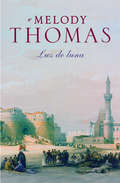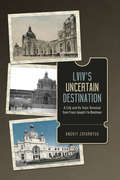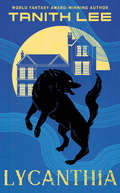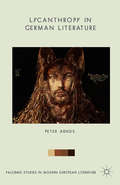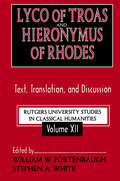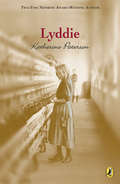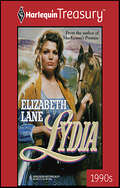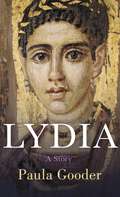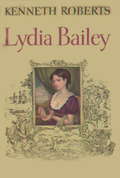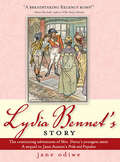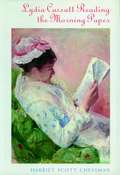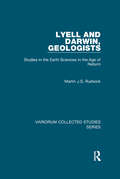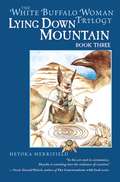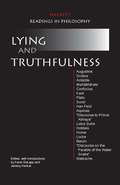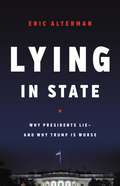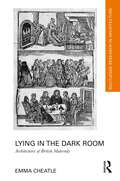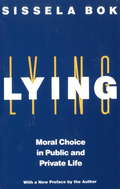- Table View
- List View
Luz de luna (Familia Donally #Volumen 2)
by Melody ThomasUna atracción que romperá con todas las convenciones.La segunda novela de la saga romántica histórica de los Donally. El desierto egipcio a la luz de la luna... El último lugar donde Brianna Donally habría imaginado que encontraría a un hombre tan libre y poco convencional como ella, alguien por quien infringir las normas no escritas de la estricta sociedad victoriana arriesgándose a provocar un escándalo. Hace años que el comandante Michael Fallon se alejó de su aristocrática familia, cambió de apellido y se alistó en el ejército con la esperanza de pasar página al pasado. Desde entonces no ha querido ni pretendido ser un caballero. Sin embargo, algo se agita en su interior ante el acuerdo ilícito que le propone esta joven decidida y arrogantemente independiente. Porque por primera vez en mucho tiempo una emoción distinta se ha despertado en él. Reseña:«Luz de luna es una cautivante historia donde se pone de manifiesto del talento de Melody Thomas para construir personajes y escenarios únicos.»Romantic Times
Lviv’s Uncertain Destination: A City and Its Train Terminal from Franz Joseph to Brezhnev
by Andriy ZayarnyukLviv’s Uncertain Destination examines the city’s tumultuous twentieth-century history through the lens of its main railway terminal. Whereas most existing studies of eastern European cities centre their stories on discrete ethnic groups, milestone political events, and economic changes, this book’s narrative is woven around an important site within the city’s complex spatial matrix. Combining architectural, economic, social, and everyday life history, Andriy Zayarnyuk shows how different political regimes created dissimilar social spaces even on the same streets and in the same buildings. His narrative leads us to rethink how the late imperial Habsburg and Romanov, Stalinist and post-Stalinist Soviet, interwar Polish, and Nazi German regimes produced, structured, and controlled urban space. Focusing on railway workers, the book also draws attention to the history of Lviv’s wage earners, who constituted the majority of the city’s adult population.
Lycanthia
by Tanith LeeFor the first time in e-book format, a gothic tale of werewolves in a remote French village from a master of dark fantasy.Tanith Lee's classic gothic novel tells a tale of werewolves in a chateau in remote France.
Lycanthropy in German Literature (Palgrave Studies in Modern European Literature)
by Peter ArndsLycanthropy in German Literature argues that as a symbol of both power and parasitism, the human wolf of the Germanic Middle Ages is iconic to the representation of the persecution of undesirables in the German cultural imagination from the early modern age to the post-war literary scene.
Lyco of Troas and Hieronymus of Rhodes: Text, Translation, and Discussion (Rutgers University Studies in Classical Humanities)
by Stephen WhiteVolume 12 in the RUSCH series continues work already begun on the School of Aristotle. It focuses on two Peripatetic philosophers who lived in the third century BCE, when Stoicism and Epicureanism flourished. Lyco of Troas was the third head of the Peripatos after Aristotle. Hieronymus of Rhodes was a member of the school and an antagonist of Lyco.Excellence in teaching was Lyco's distinguishing attribute, but he also attracted benefactors and had the reputation of being a bon vivant. Hieronymus is best known for his work on ethics, but he also wrote on literature, history, and rhetoric. Our understanding of the work being done in the Peripatos during the third century BCE will be greatly enhanced by Peter Stork's new edition of Lyco and Stephen White's edition of Hieronymus.The two editions in this volume are accompanied by full translations as well as notes on the Greek and Latin texts (an apparatus criticus) and substantive notes that accompany the translation. The editions will replace those of Fritz Wehrli, which were made over half a century ago and published without an accompanying translation. In addition to the two editions, this volume includes ten essays that address significant themes presented by the texts. Three of the essays deal with biographical material: "Diogenes Life of Lyco" (J orgen Mejer), "Hieronymus in Athens and Rhodes" (Elisabetta Matelli), and "Peripatetic Philosophers as Wandering Scholars" (Peter Scholz). Four develop philosophical topics: "Hieronymus of Rhodes on Vision" (Todd Ganson), "The Historical Setting of Hieronymus fr. 10 White" (Peter Lautner), "Peripatetic Reactions to Hellenistic Epistemology" (Hans Gottschalk), and "Lyco and Hieronymus on the Good Life" (Stephen White). Three concern rhetoric and literature: "Lyco Phrastikos" (William Fortenbaugh), "Hieronymus on Isocrates' Style" (David Mirhady), and "Hieronymus in Ancient Commentaries on Hesiod's Shield" (Andrea Martano).
Lycurgan Athens and the Making of Classical Tragedy
by Johanna HaninkThrough a series of interdisciplinary studies this book argues that the Athenians themselves invented the notion of 'classical' tragedy just a few generations after the city's defeat in the Peloponnesian War. In the third quarter of the fourth century BC, and specifically during the 'Lycurgan Era' (338-322 BC), a number of measures were taken in Athens to affirm to the Greek world that the achievement of tragedy was owed to the unique character of the city. By means of rhetoric, architecture, inscriptions, statues, archives and even legislation, the 'classical' tragedians (Aeschylus, Sophocles and Euripides) and their plays came to be presented as both the products and vital embodiments of an idealised Athenian past. This study marks the first account of Athens' invention of its own theatrical heritage and sheds new light upon the interaction between the city's literary and political history.
Lyddie
by Katherine PatersonFrom two-time Newbery award-winning author Katherine Paterson.When Lyddie and her younger brother are hired out as servants to help pay off their family farm's debts, Lyddie is determined to find a way to reunite her family once again. Hearing about all the money a girl can make working in the textile mills in Lowell, Massachusetts, she makes her way there, only to find that her dreams of returning home may never come true.Includes an all-new common core aligned educator's guide."Rich in historical detail...a superb story of grit, determination, and personal growth." —The Horn Book, starred review"Lyddie is full of life, full of lives, full of reality." —The New York Times Book ReviewAn ALA Notable Book An ALA Best Book for Young Adults A Booklist Editor's Choice American Bookseller "Pick of the Lists" School Library Journal Best Book Parents magazine Best Book
Lydia
by Elizabeth LaneTHE WAR WAS OVER BUT THE BATTLE HAD JUST BEGUNSarah Parker had tried to escape her past in a dusty mining town. But any hope of redemption was lost once Donovan Cole arrived, carrying battle-seared memories and a bellyful of hate—all for the woman she'd been during a time she'd hoped to forget!"The Angel of Miner's Gulch," they called her. Fallen angel, more likely, Donovan swore. For the "sainted" Miss Sarah had been a lying, coldhearted Yankee spy who knew how to capture a man and make him her own—forever!
Lydia
by Paula GooderThe New Testament tells us very little about Lydia, a seller of purple cloth who was living in Philippi when she met the apostle Paul on his second missionary journey. And yet she is considered the first recorded convert to Christianity in Europe. In her second work of fiction, Biblical scholar and popular author and speaker Paula Gooder tells Lydia's story - who she was, the life she lived and her first-century faith - and in doing so opens up Paul's letter to the Philippians, giving a sense of the cultural and historical pressures that shaped Paul's thinking, and the faith of the early church.Written in the gripping style of Gerd Theissen's The Shadow of the Galilean, and similarly rigorously researched, this is a book for everyone and anyone who wants to engage more deeply and imaginatively with Paul's theology - from one of the UK's foremost New Testament scholars.
Lydia
by Paula GooderThe New Testament tells us very little about Lydia, a seller of purple cloth who was living in Philippi when she met the apostle Paul on his second missionary journey. And yet she is considered the first recorded convert to Christianity in Europe. In her second work of fiction, Biblical scholar and popular author and speaker Paula Gooder tells Lydia's story - who she was, the life she lived and her first-century faith - and in doing so opens up Paul's letter to the Philippians, giving a sense of the cultural and historical pressures that shaped Paul's thinking, and the faith of the early church.Written in the gripping style of Gerd Theissen's The Shadow of the Galilean, and similarly rigorously researched, this is a book for everyone and anyone who wants to engage more deeply and imaginatively with Paul's theology - from one of the UK's foremost New Testament scholars.
Lydia Bailey
by Kenneth RobertsIt is 1800, and Albion Hamlin's client has run afoul of the notorious Alien and Sedition Acts. Before he knows what has happened, Albion has lost his case and fallen in love -- with his client's niece, Lydia Bailey. Roberts skillfully blends history, romance, and adventure once again in this novel.
Lydia Bennet's Story
by Jane OdiweLydia Bennet is the flirtatious, wild and free-wheeling youngest daughter. Her untamed expressiveness and vulnerability make her fascinating to readers who'll love this imaginative rendering of Lydia's life after her marriage to the villainous George Wickham. Will she mature or turn bitter? Can a girl like her really find true love?In Lydia Bennet's Story we are taken back to Jane Austen's most beloved novel, Pride and Prejudice, to a Regency world seen through Lydia's eyes where pleasure and marriage are the only pursuits. But the road to matrimony is fraught with difficulties and even when she is convinced that she has met the man of her dreams, complications arise. When Lydia is reunited with the Bennets, Bingleys, and Darcys for a grand ball at Netherfield Park, the shocking truth about her husband may just cause the greatest scandal of all ..."A breathtaking Regency romp!"-Diana Birchall, author of Mrs. Darcy's Dilemma
Lydia Cassat Reading the Morning Paper: A Novel
by Harriet Scott ChessmanHarriet Scott Chessman takes us into the world of Mary Cassatt's early Impressionist paintings through Mary's sister Lydia, whom the author sees as Cassatt's most inspiring muse. Chessman hauntingly brings to life Paris in 1880, with its thriving art world. The novel's subtle power rises out of a sustained inquiry into art's relation to the ragged world of desire and mortality. Ill with Bright's disease and conscious of her approaching death, Lydia contemplates her world narrowing. With the rising emotional tension between the loving sisters, between one who sees and one who is seen, Lydia asks moving questions about love and art's capacity to remember. Chessman illuminates Cassatt's brilliant paintings and creates a compelling portrait of the brave and memorable model who inhabits them with such grace. Lydia Cassatt Reading the Morning Paper includes five full-color plates, the entire group of paintings Mary Cassatt made of her sister.
Lydia Fielding: a gloriously heartwarming novel set on Exmoor from bestselling author Susan Sallis
by Susan SallisBy the Sunday Times bestselling author and multi-million copy seller Susan Sallis, this is a beautiful and moving novel perfect for fans of Maeve Binchy, Lucinda Riley and Rosamunde Pilcher.READERS ARE LOVING LYDIA FIELDING!"A wonderful story. Highly recommend." - 5 STARS"A story that kept me wanting to turn the pages...I was hooked..." - 5 STARS"The story has great pace and I couldn't put it down." - 5 STARS*****************************************************************A THWARTED LOVE. A SEARCH FOR A NEW LIFE FREE FROM HEARTBREAK. When Lydia celebrates her coming of age, the whole of her Exmoor village celebrates with her. Two men attract her interest that night: handsome, ambitious Gus Pascoe, who covets the land her father farms; and Wesley Peters, brought up as a strict Methodist, whose seemingly upright religious family hides a terrible secret.Wesley wants only to protect and cherish Lydia, but when his sister becomes the scandal of the neighbourhood and is forced to marry Lydia's brother, Alan, a bitterness grows between the two families which threatens to keep Lydia and Wesley apart forever. In despair Lydia flees to Bristol. Will she be able to free herself from the tragedy and heartbreak of her past life?
Lydia Marmalade and the Christmas Wish: A magical festive adventure to entertain the whole family!
by Cariad LloydOn a dark Christmas evening, sometimes you need magic to light the way forward ... Sparkling Christmas fiction full of heart and humour for children of 9-11: comedian Cariad Lloyd creates an unforgettable seasonal story for all the family. Perfect for fans of A Boy Called Christmas and The Christmasaurus.Christmas is the best time to believe in magic ... One winter evening, Lydia Marmalade arrives at Lady Partridge's mansion. She has nothing except her sausage dog, Colin, but she's not going to let that stop her making this her new home. But Lady Partridge isn't at all keen to make Lydia part of the family. If Lydia doesn't behave herself until the end of the winter season, she'll cast her off entirely. And now her mother's gone, Lydia doesn't have anywhere else to live.Helped (and often hindered) by a winter sprite, a snowstorm and a hungry Colin, Lydia makes a wish on the most magical night of the year ... An unforgettable seasonal story for all the family, from the brilliantly funny Cariad Lloyd. Previously released in audio as The Christmas Wish-tastrophe.
Lydia Marmalade and the Christmas Wish: A magical festive adventure to entertain the whole family!
by Cariad LloydWhen Lydia Marmalade makes a wish on the most magical night of the year, little does she know the chaos she's about to unleash. Could one simple wish start a . . . wish-tastrophe?'Christmas magic - a book only Cariad could write with such beauty and relatability!' Giovanna Fletcher'Full of wit and larger-than-life characters' The Daily MailOne winter evening, Lydia Marmalade arrives at Lady Partridge's mansion. She has nothing to her name except her sausage dog, Colin, but she's determined to make this her new home.Lady Partridge isn't at all keen to make Lydia part of the family. If Lydia doesn't behave herself until the end of the winter season, she'll cast her off entirely. And now her mother's gone, Lydia doesn't have anywhere else to live.Helped (and often hindered) by a mischievous winter sprite, a grumpy butler and a hungry Colin, Lydia makes a wish on the most magical night of the year. Sometimes you just need magic to light the way forward . . .The hilarious new Christmas story to read with all the family, from comedian and writer Cariad Lloyd with gorgeous illustrations by Ma Pe. Perfect for fans of A Boy Called Christmas and The Christmasaurus.
Lyell and Darwin, Geologists: Studies in the Earth Sciences in the Age of Reform
by Martin J.S. RudwickThe studies in this second volume by Martin Rudwick (the first being The New Science of Geology: Studies in the Earth Science in the Age of Reform) focus on the figures of Charles Lyell and Charles Darwin. Lyell rose to be of pivotal importance in the second quarter of the 19th century because he challenged other geologists throughout Europe by probing their methods and conclusions to the limit. While adopting their goal of reconstructing the contingent history of the earth, he claimed that the physical processes observable in action in the present could explain far more about the past than was commonly believed, and that it was unnecessary to postulate occasional catastrophic events of still greater intensity. Far more controversial was Lyell's further claim that the earth and its life had always been in a stable steady state, rather than developing in a broadly linear or directional fashion. His younger friend Charles Darwin first made his name as a Lyellian geologist; Darwin's early work in geology, studied here, provided important foundations for his later and more famous research on speciation and other biological problems.
Lying About Hitler: History, Holocaust and the David Irving Trial
by Richard J. EvansTo those who argue that the London court's 2000 ruling against Holocaust denier Irving threatens to silence legitimate historians' questions on the Nazi extermination of Jews, the Cambridge U. specialist on modern German history who was the principal expert witness for the defense (of Deborah Lipstadt for libel) says, in effect, rubbish. Evans explains how Irving's "analysis" distorts the historical record to serve his revisionist agenda.
Lying About Hitler: History, Holocaust, and the David Irving Trial
by Richard J. EvansIn ruling against the controversial historian David Irving, whose libel suit against the American historian Deborah Lipstadt was tried in April 2000, the High Court in London labeled Irving a falsifier of history. No objective historian, declared the judge, would manipulate the documentary record in the way that Irving did. Richard J. Evans, a Cambridge historian and the chief adviser for the defense, uses this famous trial as a lens for exploring a range of difficult questions about the nature of the historian's enterprise.
Lying Down Mountain
by Heyoka MerrifieldIn this third volume of the White Buffalo Woman Trilogy, Heyoka Merrifield continues the story of White Buffalo Woman and her journey through the land of the Lying Down Mountain. Set in the home of the peaceful Hopi Nation and based on Hopi culture and mythology, Lying Down Mountain contains sacred wisdom of peace and spirituality that can bring tranquility to today's turbulent Mother Earth. The Native American saga begins with the first two volumes in the series, Eyes of Wisdom and Painted Earth Temple.
Lying and Truthfulness
by Kevin Delapp Jeremy HenkelThis anthology provides a set of distinctive selections that explore both Western and Eastern views of lying and truthfulness, including selections from Augustine, Grotius, Aristotle, the Mahābhārata, Confucius, Kant, Plato, Sunzi, Han Feizi, Aquinas, the Lotus Sutra, Hobbes, Hume, Locke, Bacon, Nietzsche, and more. Hackett Readings in Philosophy is a versatile series of compact anthologies, each devoted to a topic of traditional interest in philosophy or political theory. Selections are chosen for their accessibility, significance, and ability to stimulate thought and discussion.
Lying in State: Why Presidents Lie -- And Why Trump Is Worse
by Eric AltermanThis definitive history of presidential lying reveals how our standards for truthfulness have eroded -- and why Trump's lies are especially dangerous.If there's one thing we know about Donald Trump, it's that he lies. But he's by no means the first president to do so. In Lying in State, Eric Alterman asks how we ended up with such a pathologically dishonest commander in chief, showing that, from early on, the United States has persistently expanded its power and hegemony on the basis of presidential lies. He also reveals the cumulative effect of this deception-each lie a president tells makes it more acceptable for subsequent presidents to lie-and the media's complicity in spreading misinformation. Donald Trump, then, represents not an aberration but the culmination of an age-old trend. Full of vivid historical examples and trenchant analysis, Lying in State is essential reading for anyone seeking to understand how we arrived in this age of alternative facts.
Lying in the Dark Room: Architectures of British Maternity (Routledge Research in Architecture)
by Emma CheatleLying in the Dark Room: Architectures of British Maternity returns to and reflects on the spatial and architectural experience of childbirth, through both a critical history of maternity spaces and a creative exploration of those we use today. Where conventional architectural histories objectify buildings (in parallel with the objectification of the maternal body), the book—in the mode of creative practice research—presents a creative-critical autotheory of the architecture of lying-in. It uses feminist, subjective modes of thinking that travel across disciplines, registers and arguments. The book assesses the transformation of maternity spaces—from the female bedchamber of seventeenth- and eighteenth-century marital homes, to the lying-in hospitals of the eighteenth and nineteenth centuries purposely built by man-midwives, to the late twentieth-century spaces of home and the modern hospital maternity wing—and the parallel shifts in maternal practices. The spaces are not treated as mute or neutral backdrops to maternal history but as a series of vital, entangled atmospheres, materials, practices and objects that are produced by, and, in turn, produce particular social and political conditions, gendered structures and experiences. Moving across spaces, systems, protagonists and their subjectivities, the book shows how hospital design and protocol altered ordinary birth at home and continues to shape maternal spatial experience today. As such, it will be of interest to a wide range of readers, from architectural historians, theoreticians, designers and students to medical humanities historians, to English Literature, humanities and material studies scholars, as well as those interested in creative-critical writing.
Lying with the Enemy
by Tim BindingIn 1943, 145,000 Germans had been slaughtered in Stalingrad. The tide of the war was beginning to turn. But not on the quiet, idyllic island of Guernsey, the only British territory to be occupied by German troops in the Second World War. Here Nazi officers still party with local girls, love affairs blossom, and the amateur dramatic society continues to stage its theatricals, if with suspiciously jackbooted pirates in Peter Pan. Then the body of a young woman, her nose and mouth filled with cement, turns up, and the comedy of manners played out by the collaborators and their captors turns sour. Food becomes scarce, facades of civility crack, the skies over Guernsey darken, and the search for a killer unearths horrors shared by the islanders and the enemy alike.
Lying: Moral Choice in Public and Private Life
by Sissela BokA thoughtful addition to the growing debate over public and private morality. Looks at lying and deception in law, family, medicine, government.
